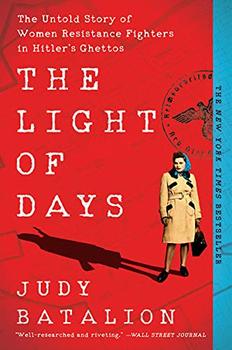Summary | Excerpt | Reviews | Beyond the Book | Readalikes | Genres & Themes | Author Bio
The Untold Story of Women Resistance Fighters in Hitler's Ghettos

Critics' Opinion:
Readers' Opinion:
First Published:
Apr 2021, 576 pages
Paperback:
Aug 2022, 592 pages
 Book Reviewed by:
Book Reviewed by:
Debbie Morrison
Buy This Book
As in the rest of Poland, modern Jewish culture flourished as Renia grew into a child of the 1930s. At that time, Warsaw alone had a staggering 180 Jewish newspapers: 130 in Yiddish, 25 in Hebrew, and 25 in Polish. Accordingly, dozens of magazine subscriptions passed through the Jędrzejów post office. The local Jewish population grew. Different prayer houses were established to suit various flavors of Judaism. Even in that small town, three Jewish bookstores, a publishing house, and Jewish libraries opened; drama groups and literary readings proliferated; political parties boomed.
Renia's father was engaged in Jewish learning and charitable endeavors, feeding the poor, tending to the dead with the chevra kadisha burial society, and serving as a local cantor. He voted Zionist. The religious Zionists honored writer Theodor Herzl's nineteenth-century ideals, believing that a true and open Jewish existence could be achieved only in a homeland where Jews were first-class citizens, in Palestine. Poland may have been their home for centuries, but it was temporary. Moshe dreamt of one day moving his family to "the promised land."
The parties organized lectures and political rallies. One can imagine Renia accompanying her beloved, bearded father to one of the large and increasingly popular Zionist town meetings, like a talk on "The Struggle for a Jewish Palestine," on May 18 1937. Clad in her Polish schoolgirl white-and-navy-blue "sailor" suit, pleated skirt, and knee-high socks, forever a lover of promenades, Renia clasped Moshe's hand as they marched past the two new Zionist libraries to the lively gathering where hundreds of Jews debated and discussed—riled by questions of belonging. As Poles negotiated their new identities in their newly stabilized homeland, so did Jews. How did they fit into this novel country, a place where they had lived continually for more than a thousand years, yet were never truly considered Polish? Were they Polish first or Jewish first? The modern question of Diaspora identity was at a fever pitch, especially due to rapidly rising antisemitism.
* * *
Moshe and Leah Kukielka prized education. The country saw a mass influx of Jewish schools: secular Hebrew schools, Yiddish prep schools, single-sex religious schools. Of Jędrzejów's four hundred Jewish children, one hundred studied at a charity Talmud Torah, a Jewish nursery, or the local branch of the Beit Yaakov girls' elementary school, where students wore long sleeves and stockings. For reasons of proximity—and because religious education was costly and often reserved for sons only—Renia, like many Jewish girls, attended Polish public school.
No matter. She was at the top of her class of thirty-five. Renia had mainly Catholic friends and spoke fluent Polish in the schoolyard. Unbeknownst to her at time, this cultural immersion, including her capacity to banter in the national tongue without a Jewish-sounding accent, would be her most critical training for the underground. But while Renia excelled and assimilated, she was not entirely included. At a ceremony when she was called up to receive an academic award, a classmate threw a pencil case at her forehead, leaving a lasting impression—literally. So, was she in or was she out? She personally straddled the centuries-old hurdle: the "Polish Jewish identity" question.
Since its foundation, Poland was evolving. With ever-changing geographical boundaries, its ethnic composition varied as new communities folded into its borders. Medieval Jews migrated to Poland because it was a safe haven from western Europe, where they were persecuted and expelled. Jews were relieved to arrive in this tolerant land with economic opportunity. "Polin," the Hebrew name for the country, comprises "Po" and "Lin," and means "Here, we stay." Polin offered relative freedom and safety. A future.
Excerpted from The Light of Days by Judy Batalion. Copyright © 2020 by Judy Batalion. Excerpted by permission of William Morrow. All rights reserved. No part of this excerpt may be reproduced or reprinted without permission in writing from the publisher.




Silent gratitude isn't much use to anyone
Click Here to find out who said this, as well as discovering other famous literary quotes!
Your guide toexceptional books
BookBrowse seeks out and recommends the best in contemporary fiction and nonfiction—books that not only engage and entertain but also deepen our understanding of ourselves and the world around us.